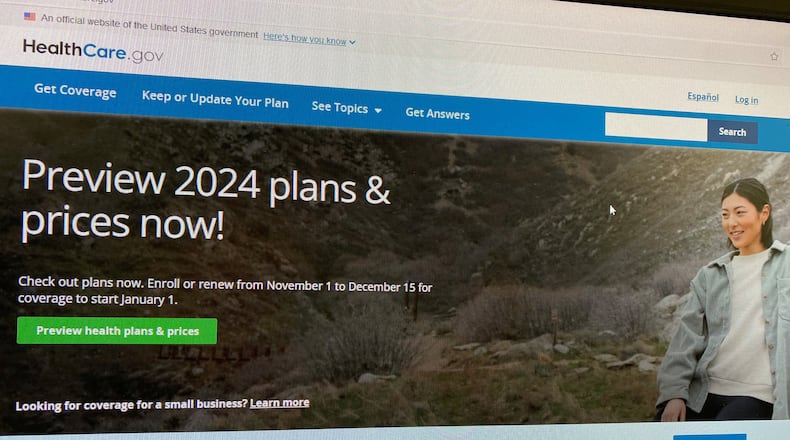Georgia had the nation’s third highest increase in people getting health insurance on the Affordable Care Act marketplace over the last four years, as additional federal subsidies were rolled out, new research has found.
The ACA marketplace exchange, also known as Obamacare, uses government subsidies to offer shoppers affordable, private health insurance.
A study, conducted by KFF, a nonprofit health policy research organization, found Georgia and other states with the greatest growth in ACA enrollment since 2020 were those with the highest percentage of uninsured people to start with. The top five states in the study — Texas, Mississippi, Georgia, Tennessee and South Carolina ― had declined to expand Medicaid to insure all their poor adults. That left them with some of the nation’s largest uninsured populations prior to the pandemic.
During the pandemic, Congress under President Biden enacted temporary subsidies, enabling those people to access virtually free ACA plans with very low deductibles. The extra subsidies are scheduled to expire in 2025.
“I think the lesson is that uninsured people want health insurance,” said Cynthia Cox, vice president of KFF and director of its program on the ACA. “But it needs to be affordable for them. And once you see a free health insurance plan that has a low deductible, it’s hard to turn that down.”
In the four years of the study, Texas more than tripled its enrollment. Georgia nearly tripled its enrollment, with an increase of 181% between 2020 and 2024.
KFF’s study found that until 2022, Georgia has had the nation’s third-highest rate of uninsured people, behind Texas and Oklahoma.
But Georgia’s bad ranking might be changing. About 1.3 million Georgians signed up for ACA coverage for 2024 as of last count. More than half of those people — over 700,000 — earn just over the poverty level and now have access to the newly subsidized, robust insurance plans.
In a written statement, a spokesman for Kemp celebrated the news from the study and said it validates what the governor has said for years.
“Governor Kemp’s decision to reject full Medicaid expansion and instead take a conservative, Georgia-centric, and innovative approach has provided more than 700,000 Georgians with quality, affordable private health insurance rather than government-run healthcare,” Kemp’s spokesman, Garrison Douglas said.
Under the ACA, states can expand Medicaid to all their poor adults, as well as poor adults just over the poverty level, with the federal government paying 90% of the cost. Georgia is one of 10 states that have not signed on for the expansion.
If Georgia had accepted the federal Medicaid expansion offer, those 700,000 people just above the poverty level would have government-run Medicaid instead of the ACA private plans. Under Kemp’s approach, however, perhaps 290,000 people below the poverty level remain uninsured. The poverty level is an individual earning $15,060 a year or less; or a household of three earning $25,820 a year or less.
The political interest in Georgia has seemingly moved on from accepting the federal Medicaid expansion to finding a way to offer people better coverage than standard Medicaid. The Legislature this year investigated an alternative expansion option in Arkansas that allowed poor residents there to buy private ACA plans. A similar plan here could cover the state’s estimated 290,000 currently uninsured, poor residents.
But Kemp turned that down in order to focus on his own program, a more limited expansion with work and activity requirements, called Pathways to Coverage.
As to the temporary federal subsidy program, it is unclear what will happen to the 700,000 policyholders just over the poverty level who are now on ACA plans if Congress lets those subsidies expire.
First, the enhanced federal subsidies enacted under the American Rescue Plan Act and the Inflation Reduction Act made plans virtually free to people just over the poverty level. That was especially powerful in the states like Georgia that have not expanded Medicaid to cover all their poor adults. Under the Biden-era subsidies, many of those very low-income people are now able to get plans with free premiums and annual deductibles of perhaps $100 to $200.
The enhanced federal subsidies also helped people at the higher ends of the income ladder.
They took care of a “subsidy cliff” that used to exist for higher-income people, where subsidies used to vanish as their incomes rose. Under the Biden-era subsidies, though, no one, however affluent, should pay more than 8.5% of their income on ACA premiums.
Kemp has his own collection of initiatives for the ACA, grouped under the heading of “Georgia Access.” One of those was a state subsidy that funds premiums, called “reinsurance.” Reinsurance has helped higher-income people get health insurance, according to experts and Kemp aides’ forecasts.
“I would guess that ... where these enhanced subsidies (federal) are in effect, the (state) reinsurance is not driving a lot of enrollment,” said Cox, the KFF official.
One thing that probably helped, she said: The Kemp administration last year put a lot of funding into advertising for ACA plans through Georgia Access.
The important role of the federal subsidies means policymakers need to think hard about 2025, Cox said.
“If Congress does not act to renew these (federal enhanced) subsidies, then people will pay a significant premium increases,” Cox, the KFF researcher, said. “I would expect that many people would drop their coverage.”
About the Author
Keep Reading
The Latest
Featured




